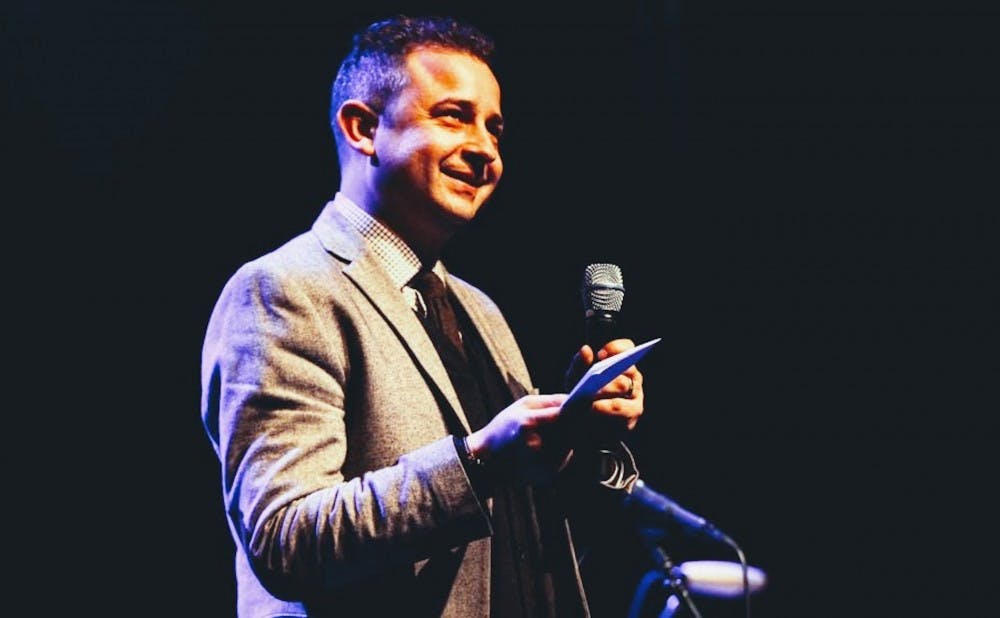When Aaron Greenwald first came to Duke, Duke Performances was a newly formed arts organization creating local programming. Over the next 12 years, he transformed it into a world-class arts presenter.
Scott Lindroth, vice provost for the arts, announced that Aaron Greenwald had resigned via a Facebook post Jan. 10. Eric Oberstein, former associate director of Duke Performances and Trinity ‘07, will now serve as interim director while the office of the vice provost for the arts conducts a nationwide search for the next director.
Greenwald joined Duke Performances as interim director in 2007 and was appointed director in 2008. He decided to step away from Duke Performances after realizing he had achieved all of his goals for the organization, including rethinking its programming structure and creating a collaboration with a world-class arts brand, which manifested in a three-year collaboration with the American Ballet Theater.
“After doing all those things, I felt it was a good time to look for the next challenge,” Greenwald said.
Perhaps the greatest change during Greenwald’s tenure was shifting the programming structure to rely more heavily on Durham venues.
“It coincided, or maybe it was a little ahead of the real renaissance Durham is having right now,” Greenwald said. “I think we’ve been a pioneer in terms of that, and I actually think that’s super uncommon among university-based performing arts presenters.”
Oberstein views this switch as a crucial part of the identity of Duke Performances.
“It has become a part of our brand, and I think it’s something that we’ll continue to do because of how it resonates with the community,” he said. “It allows us to match artists with spaces, whether that’s on campus, or in Durham.”
Oberstein was Greenwald’s first intern, having previously worked for Greenwald’s predecessor Kathy Silbiger.
“From the moment I met him, I knew he had a voracious appetite to learn about all sorts of arts, which made him so well-equipped for the job,” said Oberstein.
He emphasized that the mission of Duke Performances would remain the same, including continuing to present world-class artists on and off campus, engage the Duke community with artists and commission new work.
Greenwald estimated that Duke Performances commissioned 70 new pieces during his tenure, including work from artists with national recognition, such Jason Moran, current Kennedy Center artistic director for jazz.
“We’re part of a field that supports world class artists in making their word,” Greenwald said. Commissioning new work is a much more involved process than paying an artist a fee to perform, letting arts organizations participate more directly in the creative process.
For the last five years, Duke Performances has been averaging around a hundred performances a year, including local and national acts in a variety of venues.
“We’ve been an additive creative force, not just for Duke, not just for Durham, but for the region,” he said.
Greenwald fondly remembers “Monk@100” in 2017 as one of his favorite performances during his tenure. The 10-day event at the Durham Fruit and Produce Company commemorating the hundredth anniversary of the birthday of jazz icon and North Carolina native Thelonious Monk garnered enough attention to merit a New York Times article, he said proudly.
“That was successful beyond my wildest dreams in terms of the quality of the work, the execution and the reception,” he said.
Greenwald has also worked to increase student engagement in the arts, creating vertical artist residencies, where artists visit classes and perform through Duke Performances. He said the arts organization has gone from selling 3,000 student tickets a year to a consistently selling over 8,000 student tickets a year.
In Greenwald’s 12 years, Duke has made a bigger commitment to the arts, most notably in the construction of the new Rubenstein Arts Center. But rather than these new resources being an end result, Greenwald views them as a stepping stone to a new chapter of the arts at Duke.
“I think that the Duke arts community is more robust and has more resources than ever,” he said. “But part of what comes with that is figuring out what all that means.”
Get The Chronicle straight to your inbox
Sign up for our weekly newsletter. Cancel at any time.
The next step is to learn how to use the new resources to step up the Duke arts scene, necessitating input from Duke administration, students and Durham community members.
Lindroth said he now plans to restructure Duke Performances to be more in line with other performing arts presenters. The arts organization is current led by one director, but Lindroth plans to split the job into two positions — a managing director and an artistic director. Both positions would report directly to the office of the vice provost of the arts.
Oberstein said he would speak with Lindroth and senior Duke administrators to discuss possibilities for him and the organization moving forward, but that no decisions had been made yet.
“I hope Eric will be able to stay with Duke Performances, perhaps as managing director going forward,” Lindroth said. “I think he would be an excellent managing director for Duke Performances, but that’s a conversation we’d still need to have.” He said he would like to find a new artistic director by July 1.
Lindroth is set to step down in 2020, and Vincent Price has convened a arts planning committee to determine how the office should be organized going forward. The committee plans to take into account recent developments in the arts on and off campus.
“We are committed to continuing to support Duke Performances and to keep it as a vibrant participant in the arts scene on campus and in Durham,” Lindroth said.
Greenwald does not know where he will be next, but he is searching for a place to put his talents to use.
“I am actively trying to figure out what the next big opportunity is,” he said. “I really believe that art can impact communities and I really believe in the power of world-class performance.”

